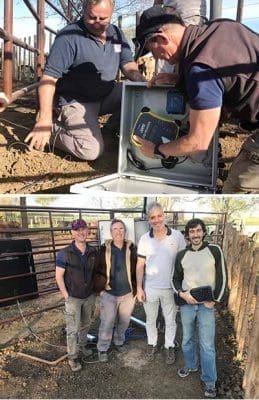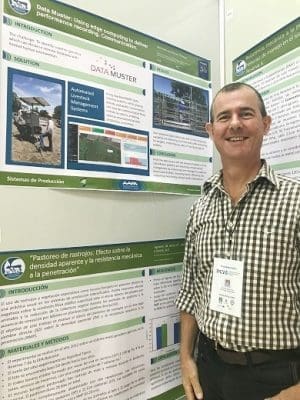THE DataMuster automated livestock management system has had its first international deployment, with two Argentinean research stations installing the system this month.
Developed by CQUniversity, the system uses walk-over-weigh scales, advanced data analytics and remote communication technologies to monitor growth and reproductive performance.
The DataMuster technology has been connected to a system developed by Argentina’s National Institute of Agricultural Technology (INTA), which automatically measures the amount of grain consumed by each individual animal in a feedlot.
CQUniversity’s Prof Dave Swain said that joining the two systems together would enable beef producers to identify animals which convert the least amount of feed into the maximum amount of beef in the shortest period of time.
“Together the systems measure, analyse data and report via app the exact amount of feed consumed and the corresponding daily weight gain of individual animals,” Prof Swain said.
“This will allow producers to select the genetics which will deliver maximum productivity with minimum impact on their grazing environment.”
 CQUniversity and INTA have been collaborating for two years, with the recent deployments made possible after receiving grant funding from the Council on Australia Latin America Relations of the Department of Foreign Affairs and Trade.
CQUniversity and INTA have been collaborating for two years, with the recent deployments made possible after receiving grant funding from the Council on Australia Latin America Relations of the Department of Foreign Affairs and Trade.
The grant provided for INTA staff to travel to Australia to work with CQUniversity researchers on connecting the electronic hardware of the two systems, and centralise data management.
The grant also enabled CQUniversity staff to travel to Argentina to install DataMuster, as well as meet with industry leaders and potential commercial partners to ensure the technology can become readily available to farmers in both countries.
At a genetic evaluation program field day held recently at INTA’s Anguil Research Station more than 50 Argentinean cattle breeders inspected the DataMuster deployment and its integration with the INTA net feed intake measurement system.
INTA’s National Meat Program coordinator Dr Anibal Pordomingo said that while the use of electronic identification systems was mandatory in Australia, their adoption was only now beginning to gather momentum in Argentina.
“So the time is right to bring together technologies like our net feed intake unit and DataMuster, which can use eID to automatically gather the information producers need to make better management decisions,” Dr Pordomingo said.
CQUniversity has established DataMuster as an agtech start-up company to deliver the technology to the beef industry and maximise the impact of its research programs to the community.
DataMuster’s web-based platform provides cattle producers with the critical information they need for more timely and precise management decisions on stocking rates, mustering and marketing dates, feed availability, and animal health treatments.
Automated livestock system prove accurate
Automated livestock management systems (ALMS) have proved as accurate as traditional manual data gathering methods in extensive trials in Central Queensland, CQUniversity’s Prof Dave Swain told a cattle industry audience during his recent visit to Argentina.

Prof Dave Swain with a DataMuster poster display at Argentina’s Animal Production Association conference.
CQUniversity’s DataMuster system was used to gather and analyse daily weight gain information from cattle in a herd at Emerald, which was also weighed regularly using traditional crush-side methods for Breedplan standards.
The trial revealed that the information gathered using ALMS – comprised of walk-over-weigh scales, and in-situ computing – provided more regular data on animal performance, while delivering extremely accurate animal weight records.
Professor Swain said this was a significant moment for Australia’s northern beef cattle producers.
“They now have access to a simple, affordable and accurate system which will allow them to participate in performance recording activities,” he said.
Speaking at Argentina’s Animal Production Association (AAPA) conference in Mar del Plata, Prof Swain detailed how the use of Edge Computing methods were breaking down the tyrannies of distance in remote Australian production systems.
The AAPA conference attracted more than 250 delegates from around the world, with experts sharing more than 380 research papers reporting results from trials conducted in 15 different countries as well as the United Nation’s Food and Agricultural Organisation.
AAPA is Argentina’s premiere research conference bringing together all disciplines of livestock research. As well as facilitating the exchange of ideas between local researchers and producers, the conference features a select group of invited international speakers from around the world.
Prof Swain told the conference that CQUni’s application of Edge Computing methods was unlocking new opportunities to collect, analyse and communicate data automatically gathered using paddock-based sensors in remote locations.
“A core component of the DataMuster system is our paddock-based DataHub, which features a micro-computer that connects and analyses data gathered from equipment including walk-over-weigh scales, electronic identification, and water monitoring,” Prof Swain said.
“The information analysis and storage structure we have implemented will allow producers to access accurate and validated data sets that support participation in benchmarking activities such as carbon trading linked to an emerging blockchain system.”
For more information on the DataMuster technology, visit www.datamuster.net.au

Source: CQU



HAVE YOUR SAY